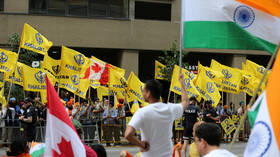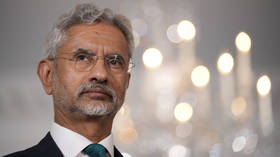India calls on Canada to produce evidence behind Trudeau claims

Indian Foreign Minister Subrahmanyam Jaishankar stated on Wednesday that India hasn’t ruled out an investigation into the killing of a Sikh separatist leader in Vancouver earlier this year. However, he added, Canada should first provide evidence to back up its allegations that New Delhi was somehow involved in the murder.
This accusation was voiced publicly by Prime Minister Justin Trudeau in September, sparking a huge diplomatic row. Trudeau said his government had “credible allegations” linking India to the assassination of the activist, who held Canadian citizenship.
India responded by angrily dismissing his assertion as “absurd.” The Canadian government has so far not presented any public evidence despite New Delhi's insistence that it do so.
Speaking at an event in London, Jaishankar said, “If you [Canada] have a reason to make such an allegation, please share the evidence because we are not ruling out an investigation.”
Meanwhile, Canada’s partners in the ‘Five Eyes’ intelligence sharing alliance, the US, the UK, Australia, and New Zealand, have expressed their “concern” and sought India’s cooperation. The Canada issue has reportedly been addressed both during Jaishankar’s current visit to the UK as well as during his September visit to the US. Last week, the matter was discussed during high level India-US talks in New Delhi.
Jaishankar also raised the concern that Canada was being too soft towards extremist elements in order to protect free speech. “We feel that Canadian politics has given space to violent and extreme political opinions which advocate separatism from India,” Jaishankar was quoted by the Hindustan Times as saying.
He noted that the Canadian authorities did not take any action when there was an attack on the Indian diplomatic mission and its diplomats were intimidated in public and on record. Soon after Trudeau first voiced the accusation, India stopped issuing visas to Canadians, citing alleged "security threats'' against diplomatic staff. Last month, however, New Delhi announced a partial resumption of visa services after reviewing the security situation.
The diplomat also described Canada as “a country with a previous history,” referring to a 1985 attack carried out by pro-Khalistan extremists, who killed all 329 on board an Air India flight. Earlier this month, Gurpatwant Singh Pannun, the founder of Sikhs for Justice (SFJ), an organization that is banned in India, threatened Air India flights flying to and from Canada.
Notably, Jaishankar’s statement came days after an Indian representative in the UN urged Canadian counterparts to prevent the “misuse of freedom of expression” and “disallow activities of groups which are promoting extremism.” “[Canada should] further strengthen the domestic framework to prevent misuse of freedom of expression, for inciting violence and disallow the activities of groups which are promoting extremism,” Indian diplomat Mohammed Hussain said at a UN Human Rights Council Review meeting on Tuesday.
In the aftermath of Trudeau’s accusation, officials in New Delhi claimed that Canada had granted asylum or citizenship to individuals facing "serious terrorism charges in India.” According to the Indian government, Canada is hosting at least nine such separatist organizations on its soil.
Where India Meets Russia – We are now on Whatsapp! Follow and share RT India in English and in Hindi













